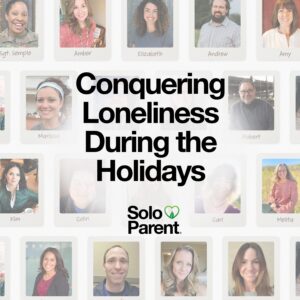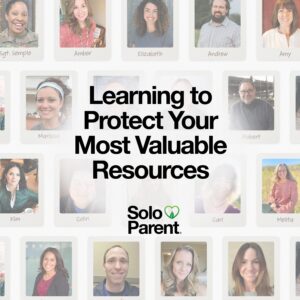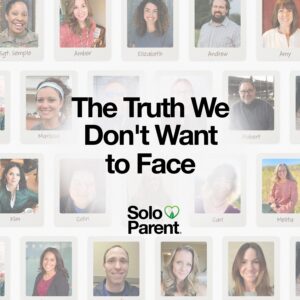Some of us know the feeling all too well. We try to “treat ourselves” with a long scroll through social media, or sink into the couch for hours of shows, only to realize afterward that we feel worse, not better. The promise of rest slips through our fingers. Instead of replenishment, we find guilt, comparison, and a heavier load than before.
For solo parents carrying the weight of both survival and nurturing, this kind of false self care can be especially dangerous. It keeps us stuck, steals our energy, and leaves us questioning whether we’re failing at even the simplest things. This conversation digs into the habits that masquerade as care, why they matter, and how to begin choosing practices that actually restore your soul.
Key Insights from This Episode
- Not everything that looks like self care is actually care
- False self care has hidden costs
- Healthy self care restores connection
Not everything that looks like self care is actually care
Survival mechanisms often sneak in under the banner of “taking care of myself.” Elizabeth shared how running started as a quiet space for her soul but quickly turned into a performance she felt pressure to prove. Amber added that self-promotion, striving to appear successful, or chasing accomplishment can leave us empty.
Self-sufficiency plays the same trick. Refusing to ask for help can feel strong, but it keeps us isolated and burned out. Robert admitted, “Not asking for help has been a bad habit of mine for years. It feels noble, but it’s not restorative.”
And then there’s comparison. What starts as winding down with social media often stirs insecurity instead. “We’re looking at everyone else’s highlight reel,” Amber said, “and what we call self care is actually harming us.” Even comparing how someone else recharges can make us feel like we’re doing it wrong.
False self care has hidden costs
What looks like rest on the surface often masks deeper exhaustion. A weekend on the couch with Netflix and a glass of wine may sound like recovery, but if Monday morning feels heavier than Friday, the practice hasn’t served you.
Elizabeth described how escapism kept her from processing emotions: “I end up feeling more overwhelmed because I never sat with what was really going on inside.” Amber agreed, adding that false self care often brings temporary relief while draining the very energy we’re desperate for.
Sometimes the cost shows up as isolation. Amber shared about a loved one who used journaling and extreme boundaries to cope, but the practice left her lonelier and more stuck than before. False self care may feel protective, but it robs us of connection.
Healthy self care restores connection
Real care isn’t always easy or indulgent. It often looks like admitting need, asking for help, or having hard conversations. “Does what you’re doing leave you more connected to God, others, and yourself?” Amber asked. That question became a touchstone throughout the conversation.
Healthy practices vary from person to person and even season to season. For one, it might be a run outside. For another, it’s stillness, journaling, or prayer. The difference lies in outcome: do you leave the moment nourished and at peace, or ashamed and more tired?
Elizabeth reminded us that even small acts of accountability—owning how our words impacted someone else, or naming where we’re avoiding—can be self care. It may feel harder than scrolling or numbing, but it restores dignity and peace.
Listener Question
“If you could outsource one part of solo parenting, what would it be?”
Elizabeth answered quickly: “Self care would be mine.”
Robert said, “Finances…I hate doing it.”
Amber reflected on her early years: “I wish I could have outsourced being the only one.”
Their answers highlight just how unique the challenges are, but they all point to the same truth: we weren’t meant to carry it alone.
Stay Connected + Get Support
We want to answer any Solo Parent questions you may have. Submit your listener questions HERE.
Additional Resources:




